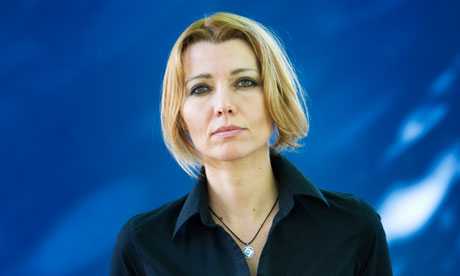Elif Shafak: ‘In Turkey, men write and women read. I want to see this change’
The bestselling Turkish writer on her wildly mixed readership, escaping pigeonholes, and why she writes all her novels twice
Interview by William Skidelsky
The Observer

Elif Shafak: ‘Art and literature should help us to get out of our mental cocoons.’ Photograph: Murdo Macleod
Born in 1971, Elif Shafak is the author of eight novels and is Turkey’s most widely read woman writer. Her work has been translated into 30 languages and she was awarded the honorary distinction of Chevalier of the Order of Arts and Letters. She divides her time between Istanbul and London. Her latest novel is Honour.
Your new novel describes an honour killing in a half-Turkish half-Kurdish immigrant family in Britain. What drew you to this subject?
I have always been interested in families, probably because I did not grow up in one. I was raised by a single, working, feminist mother. That was a bit unusual in 1970s Turkey. Families intrigue me. In this novel, I wanted to explore how we hurt the people we love most. I focused on mother-son relationships, on how mothers raise their sons as the sultans in the house and how this ruins people’s happiness in the long run.
What was the hardest thing to get right?
In my previous novels, there have been strong-headed, colourful women, of all backgrounds – Muslim, Christian, Jewish. This time, there is a male character at the heart of the story and not a pleasant one. Iskender is neither a hero nor an antihero. He is a bully, someone who breaks hearts. It was important to put myself in his shoes, to see the world the way he sees it, without judging him from above. That was an emotional challenge.
The novel was the bestseller in Turkey for six weeks. Clearly, its subject matter struck a nerve there…
It created a lot of discussion. Turkey is a complex country. Most readers are women, of all generations, and they are passionate about books. However, the written culture is mostly patriarchal. In general, men write, women read. I would like to see this pattern changing. More women should write novels, poems, plays, and hopefully more men will read fiction.
What, given this imbalance, enabled you to break through?
Honour is my eighth novel and my 11th book in Turkey. Over the years, with every book published my readership has expanded. My readers are surprisingly mixed. I have conservative readers, for instance, women with headscarves, but also many liberal, leftist, feminist, nihilist, environmentalist and secularist readers. Next to those are mystics, agnostics, Kurds, Turks, Alevis, Sunnis, gays, housewives and businesswomen… So people who wouldn’t normally talk to one another in Turkey read the same novels. This makes me happy. Art and literature should help us to get out of our mental cocoons.
As a Turkish writer with a profile in non-Muslim countries, what pressures do you feel?
When you are a “woman writer from a Muslim background” there is an expectation that you should be writing about your identity, about women in Muslim societies. A function is attributed to fiction from the non-western world. Your work should be informative, representative. A white, male, middle-class American writer can experiment with form and choose any subject he wants, but a woman writer from Algeria or Afghanistan should produce stories that fit into a certain cultural box.
Did you write Honour in Turkish and then translate it yourself?
For the last nine years, I have been writing in both English and Turkish. I write my novels in English first, then they are translated into Turkish by professional translators. Then I take their translation and rewrite. So basically I write the same novel twice. There are things I find easier to say in Turkish and others easier in English. If I write about sorrow and longing, it is easier in Turkish. If I write about humour, irony, satire, it is easier in English.
You’ve spoken of being opposed to the injunction “write what you know”…
I always start by saying to my creative writing students: “Do not feel obliged to write what you know!” You can do that, certainly. But that’s not what literature is all about. Write what you feel in your heart.
You’ve also championed the Sufi tradition, in particular the poet Rumi. Is there much understanding or even awareness of this tradition in the west?
Sadly, many don’t know anything about this rich and peaceful tradition. People in the Middle East are not necessarily more knowledgeable either. It intrigues me to see the amazing similarities among the mystical traditions of all monotheistic religions because the quest is the same. It is universal, all-embracing. It is an inner journey based on empathy and a desire to transcend the limits of the self. In this sense, Rumi’s Sufi philosophy has lots in common with literature.
Elif Shafak will speak on identity, immigration and multiculturalism at the Bristol Festival of Ideas, in association with the Observer, on 17 May
via Elif Shafak: ‘In Turkey, men write and women read. I want to see this change’ | Books | The Observer.

Leave a Reply